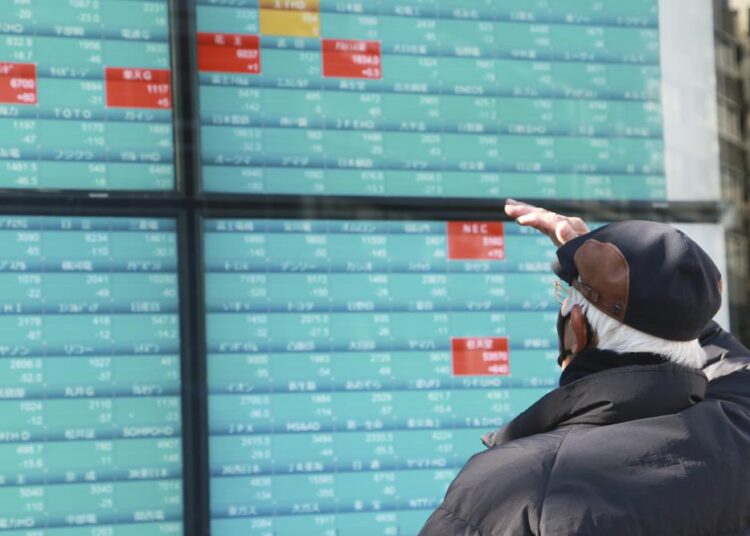BEIJING – Global stock markets and Wall Street futures tumbled Monday amid concern about the latest coronavirus variant and tighter Federal Reserve policy.
London and Frankfurt opened sharply lower. Shanghai, Tokyo and Hong Kong also fell at the start of a trading week that will be shortened by Christmas. Benchmark U.S. oil fell by more than $3 per barrel.
In Asia, the Shanghai Composite Index slid 1.1% to 3,593.60 after China’s central bank trimmed a key interest rate. The bank cut its one-year Loan Prime Rate to 0.05% but left the five-year rate and its main policy rate unchanged.
The cut is a “small step toward easing” monetary policy without changing efforts to reduce debt in real estate, Larry Hu and Xinyu Ji of Macquarie said in a report. Beijing’s use of multiple interest rates “is confusing, substantially muting the signal” if only one is cut, they said.
The Nikkei 225 in Tokyo sank 2.1% to 27,937.81 and the Hang Seng in Hong Kong lost 1.9% to 22,744.86.
The Kospi in Seoul declined 1.8% to 2,963.00 and Sydney’s S&P-ASX 200 retreated 0.2% to 7,292.20
India’s Sensex opened down 2.3% at 55,811.05. New Zealand gained while Southeast Asian markets retreated.
Traders had bid up airlines, cruise lines and other travel-related stocks on hopes omicron’s spread wouldn’t trigger more travel controls.
Sentiment has turned as the United States and other governments warn omicron is more pervasive than expected, prompting travel restrictions in some areas and cancellations of public events.
The U.S. government warned Sunday of a possible surge of “breakthrough infections” as Americans travel for Christmas and the New Year holidays.
Last week, stocks briefly rallied but then fell after Fed officials said Wednesday they might accelerate the reduction of bond purchases that inject money into financial markets. That sets the stage for the Fed to begin to raise interest rates next year.
Also potentially weighing on sentiment, a U.S. senator said Sunday he wouldn’t support President Joe Biden’s $2 trillion infrastructure, social spending and climate plan. Joe Manchin’s announcement possibly dooms the plan’s chances in the evenly split Senate.
Inflation has been a growing concern throughout 2021. Higher raw materials costs and supply chain problems have been raising overall costs for businesses, which have increased prices on goods to offset the impact.
Consumers have so far absorbed those price increases, but they are facing persistent pressure from rising prices and that could prompt a pullback in spending.
In energy markets, benchmark U.S. crude plunged $3.57 to $67.15 per barrel in electronic trading on the New York Mercantile Exchange. The contract fell $1.52 on Friday to $70.86. Brent crude, the price basis for international oils, sank $3.41 to $70.11 per barrel in London. It lost $1.50 the previous session to $73.52 per barrel.
The dollar declined to 113.41 yen from Friday’s 113.70 yen. The euro gained to $1.1261 from $1.1251.
On Friday, the S&P fell 1% as traders took money off the table after the Fed indicated it would fight inflation by speeding up the withdrawal of economic stimulus. The index is 2% below its all-time high and up 23% for the year.
The Dow lost 1.5% and the Nasdaq composite, dominated by tech stocks, slipped 0.1%.
The spread of the omicron variant has fueled fears that renewed curbs on business and travel might worsen supply chain disruptions and boost inflation.
“Omicron threatens to be the Grinch to rob Christmas,” Mizuho Bank’s Vishnu Varathan said in a report. The market “prefers safety to nasty surprises.”
In early trading, the FTSE 100 in London fell 1.7% to 7,143.60 and the DAX in Frankfurt lost 2.4% to 15,155.71. The CAC 40 in Paris sank 2% to 6,787.68.
On Wall Street, futures for the benchmark S&P 500 index and the Dow Jones Industrial Average lost 1.5%.






Discussion about this post